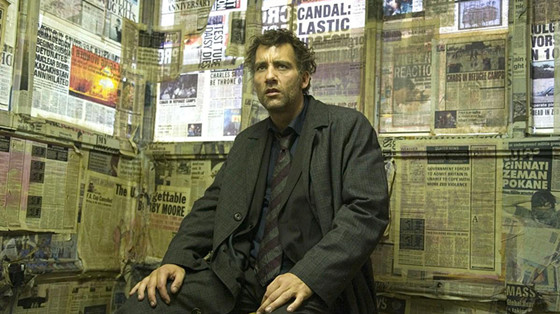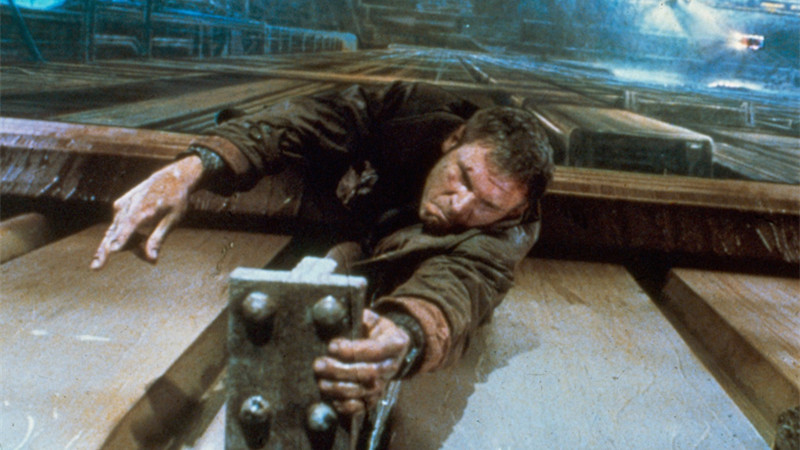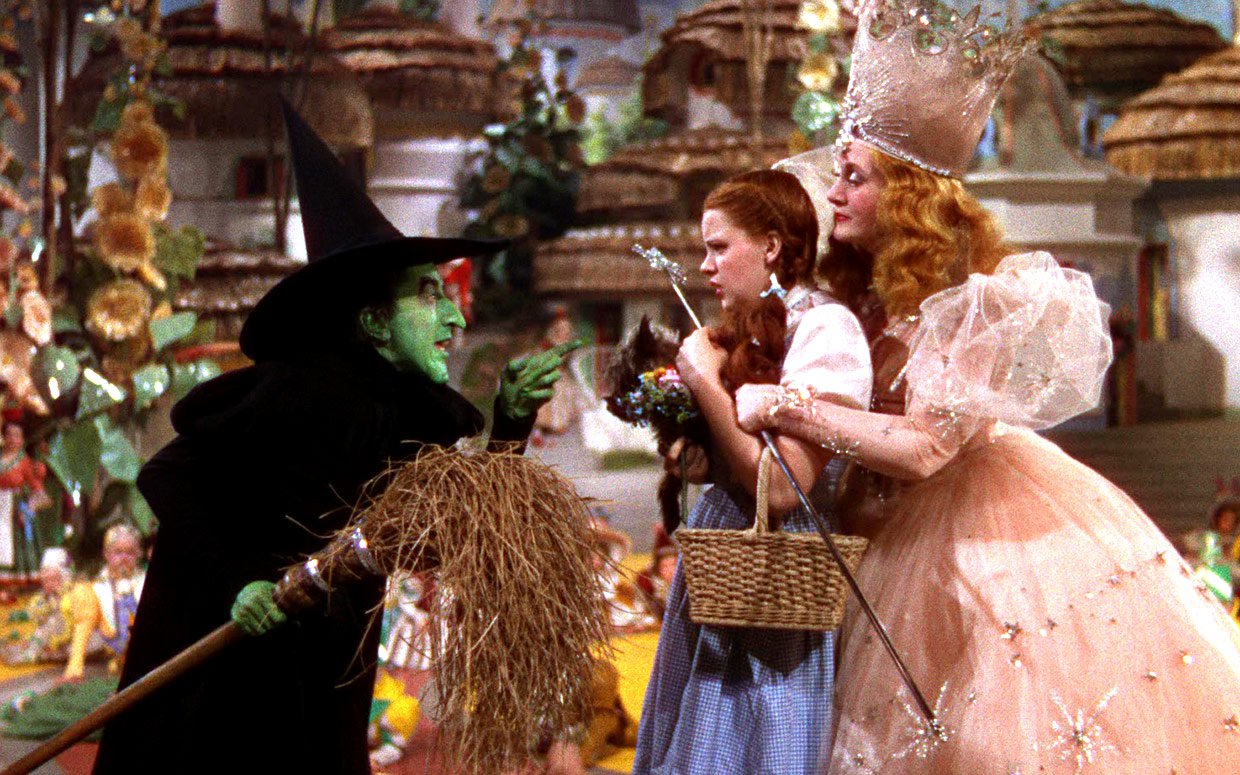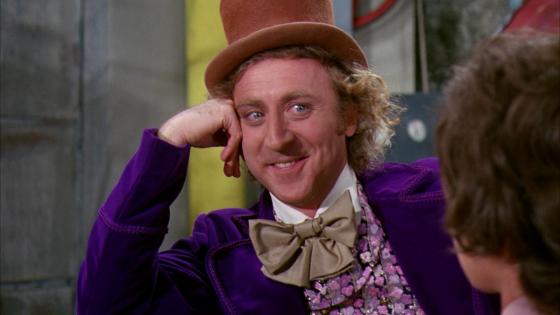6. Children of Men (2006) from The Children of Men

Children of Men is regarded as one of the greatest sci-fi films of the 21st century. Its superbly detailed dystopia is accompanied by pitch-perfect direction and a strong sense of momentum. Children of Men the movie functions as a road trip where Clive Owen’s character must deliver the only fertile woman on Earth so both she and the child she has birthed can be protected in the violent world of the film. But the main focus of the film is just a small portion of the book.
The Children of Men is not about this singular journey, this last desperate gasp of humanity, but of conflicting political goals and a uniquely masculine evil. That is, after all, why men are infertile in the book. The novel, before it was even popular, makes broad statements on patriarchy and overall is laced with a rich subtext. Its religious themes are omnipresent in the novel and there is meticulous attention paid towards sketching out the oppressive government of Britain and the questionable resistance fighters that disapprove of it.
Children of Men has an undeniable power to it but derives such power from a completely different source. Its strength lies in the story of the change of this one man, and how he radically changes his worldview to help humanity persist in its most desperate time of need. It’s a technical marvel with unbelievable long takes and is probably Cuaron’s greatest contribution to film, especially considering the immaculate car attack that takes places early in the film. The liberties it takes most likely disappoints devoted fans of the novel but those able to see its unique vision will testify to its emotional resonance and vibrantly realized world.
7. Blade Runner (1982) from Do Androids Dream of Electric Sheep?

There may be no man who gets more disrespect in adaptations than Philip K. Dick. The legendary sci-fi author almost always has his works mutilated not in terms of quality but in intent. Do Androids Dream of Electric Sheep? and Blade Runner both have empathy on the mind as the central concept, but their approaches could not be more different.
Blade Runner disposes of the heavy religious elements of the novel and the heavy focus on animals and turns its attention towards the idea of consciousness and the human experience. The depths that have entranced critics for so long concern the replicants and the idea of them being sharing human qualities. Blade Runner uses replicants to bring up important questions that poke at what exactly separates humans from other organisms and if said claims are valid. Roy Batty’s iconic monologue is this idea compressed into one mesmerizing monologue but in the book, replicants are awful.
Replicants are deplorable creations of human selfishness and simply lack the empathy humans have. It’s incredible that Blade Runner has made its imprint in film history thanks to crossing a line that Dick clearly draws in the sand. Dick concretely states the difference between humans and “andies” and draws attention to the difference between real and mechanical animals as well, which is why Deckard must kill in the first place to get a real animal. Even more incredible is that the highly influential cyberpunk cityscape of Blade Runner is nowhere to be found in the novel, which has an abandoned Earth as its setting. Blade Runner is a striking example of adaptation; a translation that seems to purposely defy the text and yet still works on its own merit.
8. The Wizard of Oz (1939) from The Wonderful Wizard of Oz

It’s such a challenge to see The Wizard of Oz as anything but a heartfelt and innocent family fantasy fare but the novel is a shocking departure from the spirit of the movie. The novel follows Dorothy into the land of Oz but the bite that book has is shocking. Almost every facet of the book is a stand-in to symbolize the issues of the gilded era of politics in the United States, where corruption was arguably at an all-time high. Along with that satiric edge, violence and dark themes are surprisingly everywhere in the book, whether it be the Tin Man chopping off the heads of forty wolves or the Wicked Witch enslaving the monkeys she uses as ammo against Dorothy.
Looking at the movie, it’s hard to see how such elements could have been adapted successfully in the 1930s, and if those elements are even worth replacing in the first place. The Wizard of Oz is one of the all-time greats of the fantasy genre, a musical piece of escapism unlike anything audiences had seen before. Nearly a century later, its charm, warmth, impeccable pacing, and lovable characters seem to be the only way The Wizard of Oz should be, even if its drastically reimagines what the original author set out for it.
9. Willy Wonka and the Chocolate Factory (1971) from Charlie and the Chocolate Factory

Once again, a childhood classic with darker undertones abandoned in movie form. There are a good number of small differences between Roald Dahl’s novel and the Gene Wilder 1971 movie, such as Charlie’s dad being removed and the family not being in nearly as dire a situation. But what always stook out to Dahl was how Gene Wilder and Mel Stuart changed the “spirit” of Willy Wonka. Willy Wonka in the book is a mysterious and nefarious force not quite meant for people of all ages to love. The black comedy extends to the death of characters like Veruca and the descriptions of areas in the factory like the chocolate river. Many have looked into the deeper meanings of the film and how Willy Wonka is not as good as he seems, but all those insights end up being very direct in the book.
The 2005 adaptation is ultimately much more faithful to Dahl, but its poor quality ends up proving the point of this list. Not every adaptation must be super faithful in order to work, in order to be the optimal movie experience. Gene Wilder and his bubbly persona makes the film much more about him than Charlie, but it also has made for an unforgettable performance and ride through one of the 1970s most cherished fantastical ride.
10. First Blood (1982) from First Blood

Much of this list hasn’t been about changing plot points but about changing mood and general atmosphere, mostly because changing tone and thematic direction make for much more jarring comparisons than adaptations that focus on different subplots. This could not be truer than the final entry, the intensely memorable 1980s movie First Blood. First Blood in book form is a stirring look at trauma for men in a post-Vietnam world. Rambo as a character is essentially at a point of no return, killing police officers with conviction and tact. That’s ultimately why the Colonel has no choice but to kill him in the book. Rambo still has not left the jungle. He still is there and the sins he has committed at home cannot be properly atoned for.
Bringing this ending to an 80s blockbuster with mega star Sylvester Stallone wouldn’t make much sense so First Blood does its very best to paint Rambo in a positive light. He is not directly responsible for the death of any police officer, allowing the viewer to justify why he lives on at the end. The raw emotion of the character and plot still finds its home in the movie, but it is full of pulp and fun along the way. Its action is much more lowkey than other movies released at the time, but this still ultimately is an action movie that does not capture the taught, highly politicized thrills of the novel. Yet in its quest to be an action movie that retains some of the book’s brains, finds itself in a league of its own in terms of action flicks able to have smarts injected into its near two-hour dose of fun.